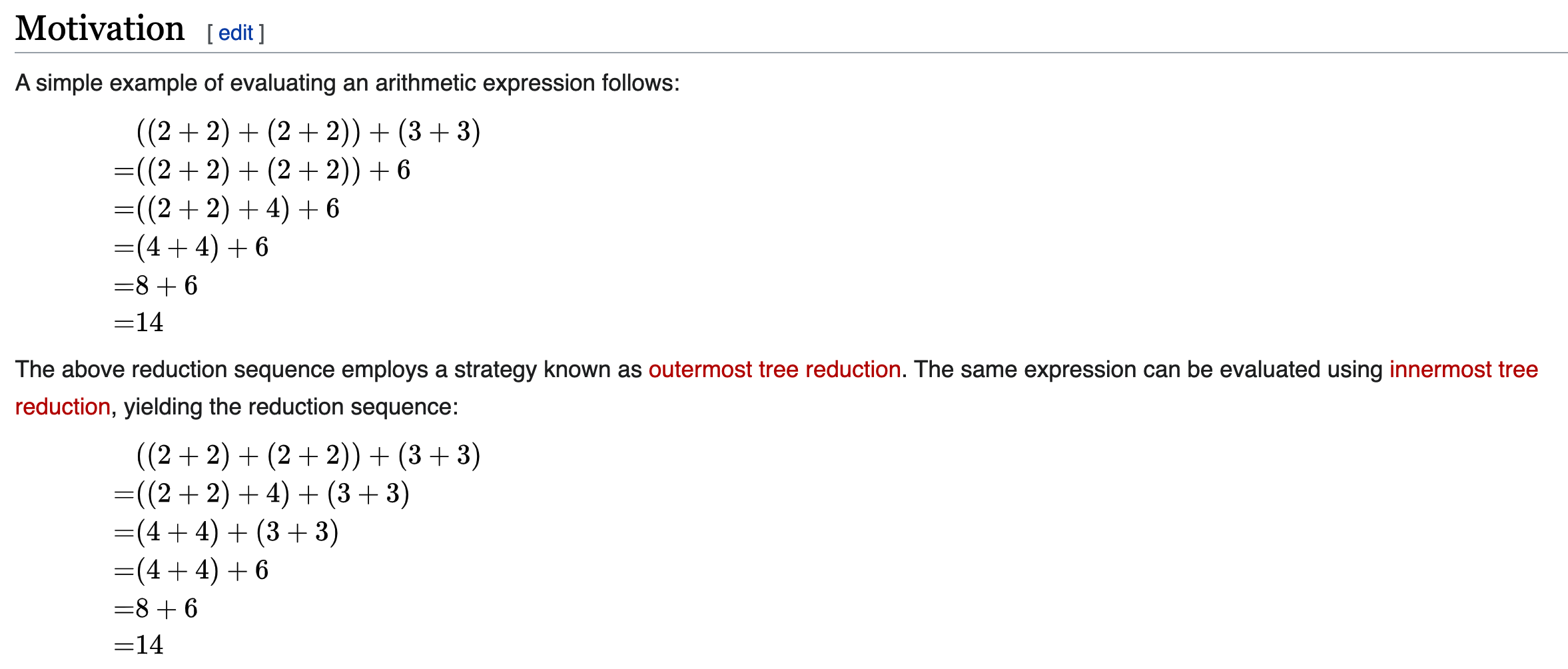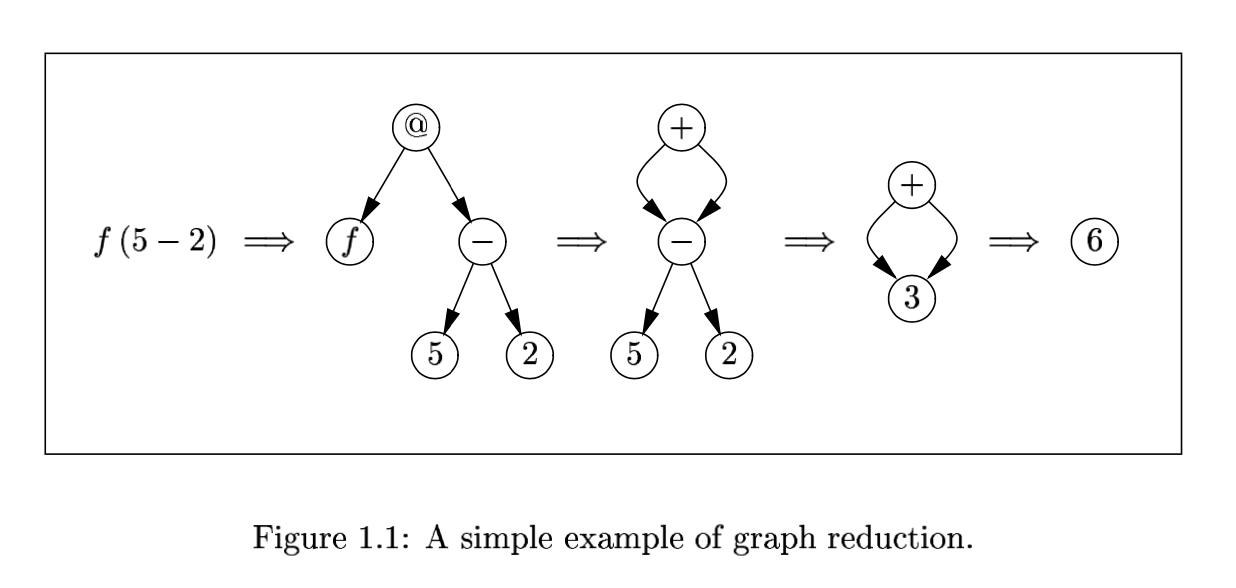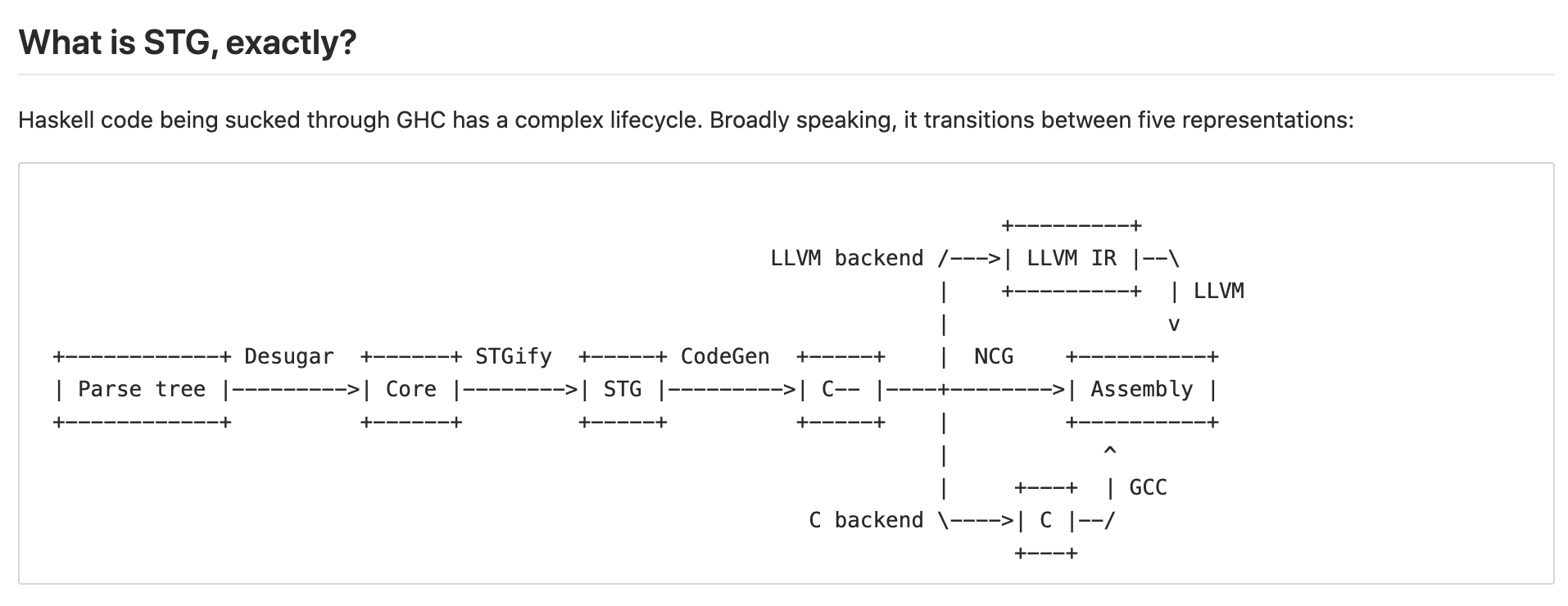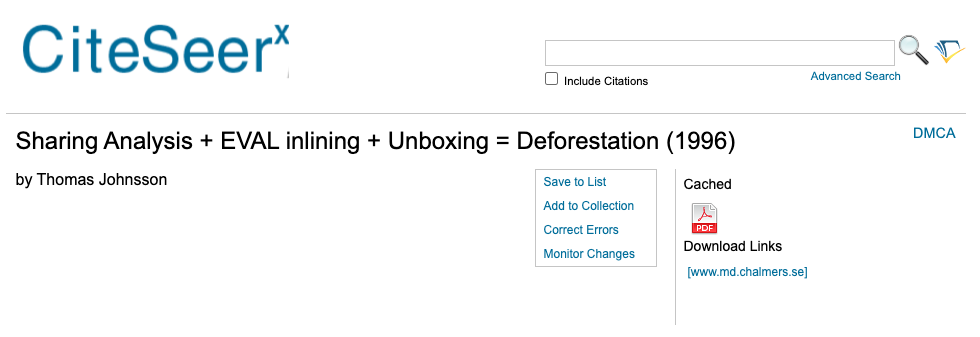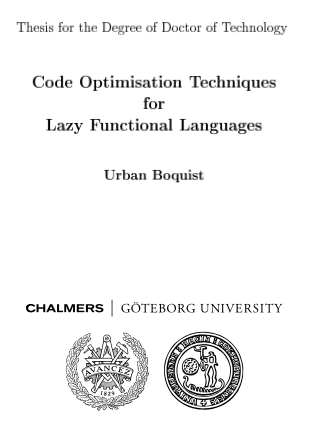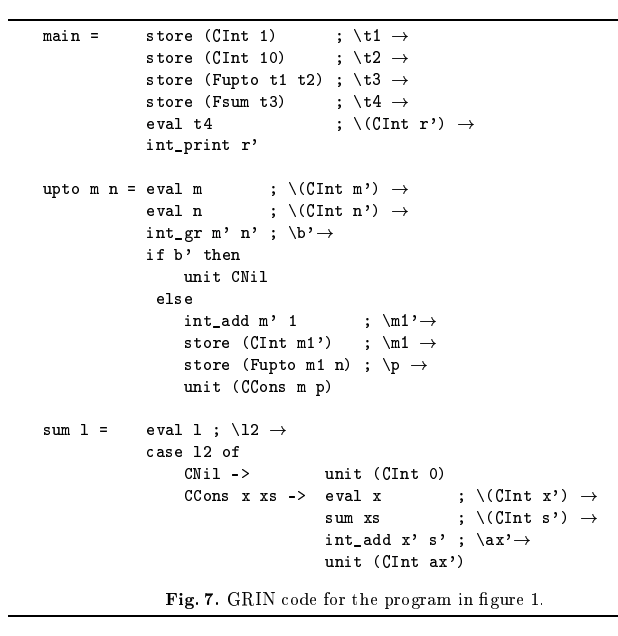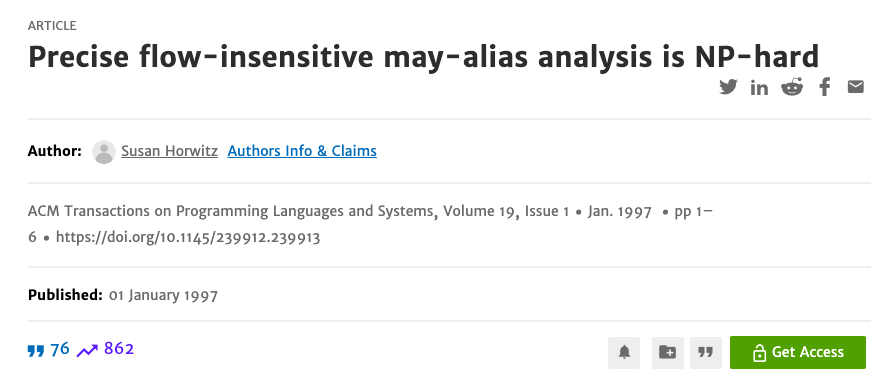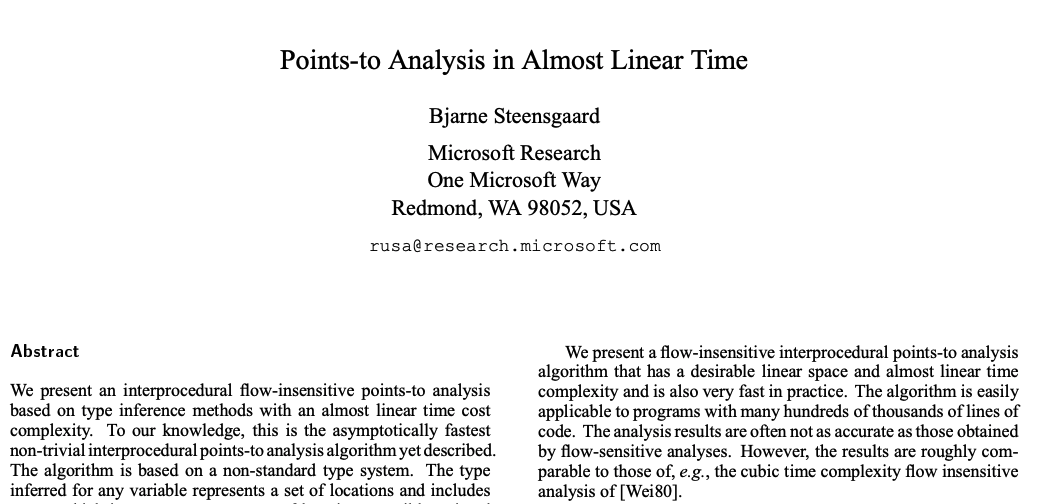| author | title | date |
|---|---|---|
David Johnson |
GRIN |
10/20/2021 |
- A strategy for the evaluation of lazy functional programs
- Research spans 70s-00s
- Interpreters
- Compiled graph reduction
- G-machine (Thomas Johnsson)
- STG (SPJ / Marlow) - GHC's current strategy
- GRIN (Thomas Johnnson)
- Reduceron (Hardware accelerated graph reduction)
f = \x -> x + x- Evaluation of a suspended function application
- STG: The function to call is unknown at compile time, the evaluation of a closure will result in some kind of indirect call, through a pointer. This makes optimisations harder.
- GRIN: forbids all unknown calls and uses control flow analysis to approximate the possible targets.
- First order
- No HOFs, defunctionalized
- Strict
- GRIN statements are evaluated strictly
- Lazy graph traversal is encoded implicitly via
eval
- State monadic
updateis likemodify'fetchis likegetpureis likereturn(<-)is like(>>=)
- SSA
- Single static assignment (all names are unique)
- Whole program optimizing
- Entire program available for optimization
grin :: { Grin }
: many1(def) { Grin $1 }
def
: var many(var) '=' do exp { Def $1 $2 $5 }
exp
: val '<-' sexp ';' exp { Bind $1 $3 $5 }
| case val of '{' many1(cpat_exp) '}' { Case $2 $5 }
| sexp ';' { Op $1 }sexp
: var many1(val) { App $1 $2 }
| pure val { Pure $2 }
| store val { Store $2 }
| fetch var '[' int ']' { Fetch $2 (Just $4) }
| fetch var { Fetch $2 Nothing }
| update var val { Update $2 $3 }
| do '{' exp '}' { SExp $3 }val
: '(' tag many(val) ')' { Node $2 $3 }
| '()' { Unit }
| lit { VLit $1 }
| var { Var $1 }
lit
: int { LitInt $1 }
| string { LitString $1 }
| double { LitDouble $1 }
| bool { LitBool $1 }-- | SSA, first-order, strict, monadic, graph-reduction IR.
newtype Grin = Grin [ Def ]
deriving (Eq, Show, Data, Typeable)-- | Top-level function definition in GRIN
-- main = pure 1 ~ Def "main" [] (Op (Pure (Lit 1)))
-- All Grin programs must have a main to execute
data Def = Def VarName [VarName] Exp
deriving (Eq, Show, Data, Typeable)data Exp
= Bind LPat SExp Exp
-- ^ Bind a value to a name, sequence computation
-- ^ do { a <- pure 1; () <- store a; pure () }
-- Bind (Pure (LitInt 1
| Case Val [CasePat]
-- ^ Case expression for forking control flow
-- ^ case x of { 1 -> 2; }
| Op SExp
-- ^ Mutually-recursive on SExp
deriving (Eq, Show, Data, Typeable, Generic)-- | GRIN core operations (fetch, store, update) modify the heap.
data SExp
= App VarName [Val]
-- f (1,2) ~ App "f" [Lit 1, Lit 2]
| Pure Val
-- ^ Returns value
| Store Val
-- ^ Stores value on the heap
| Fetch VarName (Maybe Int)
-- ^ Fetch value from the heap, optionally indexed
-- fetch a[0] ~ Fetch "a" (Just 0)
| Update VarName Val
-- ^ Update variable in-place on the heap
-- update a 2 ~ Update "a" (Lit (Lit 2))
| SExp Exp
-- ^ Mutually recursive on Exp
deriving (Eq, Show, Data, Typeable)-- | Constant patterns
data CPat
= NodePat Tag [VarName]
-- ^ Constructor node pattern
-- ^ \(Foo a b c) ~ CNodePat "Foo" ["a","b","c"]
| LitPat Lit
-- ^ Constant literal pattern
-- ^ 1 ~ CLit 1
| WildcardPat
-- ^ Matches on any wildcard pattern
deriving (Eq, Show, Data, Typeable)data Val
= Node Tag [Val]
-- ^ (Foo a b c) ~ Node "Foo" [Var "a", Var "b"]
| Unit
-- ^ (), empty / void
| VLit Lit
-- ^ Literal
| Var VarName
-- ^ Variable
deriving (Eq, Show, Data, Typeable)-- | GRIN literals go here
data Lit
= LitInt Int
| LitDouble Double
| LitString Text
| LitBool Bool
deriving (Eq, Show, Data, Typeable) f = \x -> x + xmain = do
m1 <- store (CInt 5);
m2 <- store (CInt 2);
m3 <- store (Fsub m1 m2);
m4 <- store (Ff m3);
(CInt result) <- eval m4;
pure result;
sub s1 s2 = do
(CInt s3) <- eval s1;
(CInt s4) <- eval s2;
s5 <- _prim_int_sub s3 s4;
pure (CInt s5);
f f1 = do
(CInt f2) <- eval f1;
f3 <- _prim_int_add f2 f2;
pure (CInt f3);eval e1 = do
e2 <- fetch e1;
case e2 of {
(CInt e3) ->
pure e2;
(Fsub e4 e5) ->
e6 <- sub e4 e5;
() <- update e1 e6;
pure e6;
(Ff e7) ->
e8 <- f e7;
() <- update e1 e8;
pure e8;
}Interpret the GRIN
- No unknown control flow
- GHC hardcodes
evalin the RTS.
- GHC hardcodes
- Inlining is the gateway to all optimizations
- Secrets of the GHC inliner
- GRIN inlines the
evalfunction
- Inlining eval has the effect of removing the overhead of laziness
- Inlining eval opens up a world of additional optimizations only strict languages can use
- Remove as many
fetch,update,storecalls as possible- Removes allocations, improves performance
- Inline as much of the RTS into the user's application as possible
- Deforestation for free
- Smaller binaries
- Very fast code
- Created by Thomas Johnsson
- Documented only in Boquist Thesis
main = sum (upto 1 10)
upto m n =
if m > n
then []
else m : upto (m+1) n
sum l =
case l of
[] -> 0
(x:xs) -> x + sum xs
-- > main
-- 55- Inlining eval should be done intelligently
- Can't just inline the entire
evalfunction everywhere
- Can't just inline the entire
- Precise pointer analysis
- Computationally intractable (NP-hard problem)
- Steensgaard O(n)
- trades precision for speed
- Andereson O(n^3)
- trades speed for precision
- Shapiro
- configurable implementation
- O(n) - O(n^3)
- Souffle datalog
- GRIN does not have a type system by default
- Can infer types using the static analysis result
- Local code transformations
- Evaluated Case Elimination
- Trivial Case Elimination
- Update Elimination
- Copy Propagation
- Constant Propagation
- Dead Procedure Elimination
- Dead Parameter Elimination
- Case Copy Propagation
- Whole program analysis based transformations
- Sparse Case Optimisation
- Dead Variable Elimination
- Dead Data Elimination
- Common Subexpression Elimination
- Case Hoisting
- Generalized Unboxing
- Arity Raising
evaluatedCaseElimination :: Grin -> Grin
evaluatedCaseElimination =
transformOn (defs . each . expr) $ \expr' ->
case expr' of
Case val pats
| all (casesReturnSameValue val) pats -> Op (Pure val)
| otherwise -> expr'
_ -> expr'
where
casesReturnSameValue
:: Val
-> CasePat
-> Bool
casesReturnSameValue val (_, ex) =
ex == Op (Pure val) main = do
sum 0 1 1000;
sum n29 n30 n31 = do
b2 <- _prim_int_gt n30 n31;
case b2 of {
True -> pure n29;
False ->
n18 <- _prim_int_add n30 1;
n28 <- _prim_int_add n29 n30;
sum n28 n18 n31;
}- Understand how functional programs are evaluated
- Exposure to many optimizations that are similar at the GHC core level
- Exposure to many packages that GHC itself uses (
alex,happy)
A highly optimizing backend for lazy functional languages
- Garbage Collection
- Exceptions
- HOFs
- LLVM Codegen
- Lambda calculus translation
- Additional optimizations


